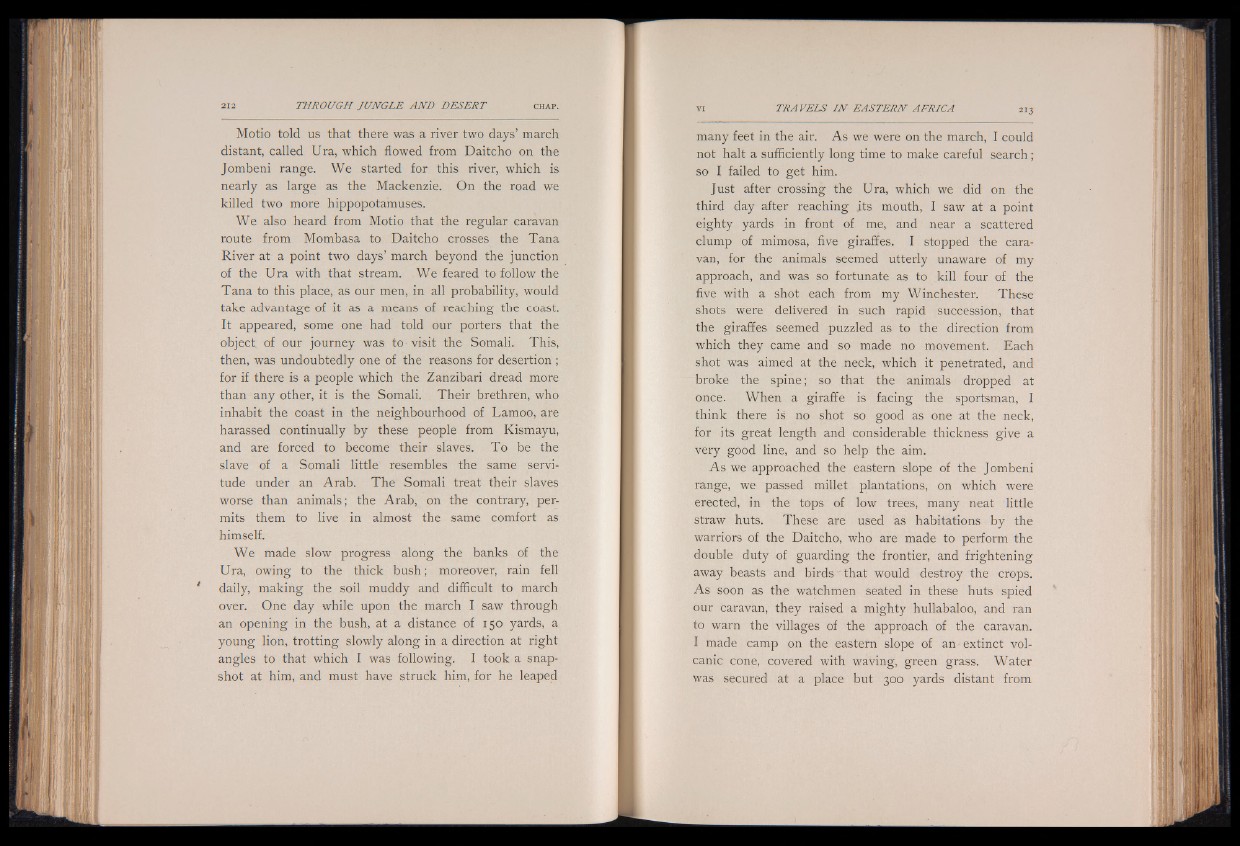
Motio told us that there was a river two days’ march
distant, called Ura, which flowed from Daitcho on the
Jombeni range. We started for this river, which is
nearly as large as the Mackenzie. On the road we
killed two more hippopotamuses.
We also heard from Motio that the regular caravan
route from Mombasa to Daitcho crosses the Tana
River at a point two days’ march beyond the junction
of the Ura with that stream. We feared to follow the
Tana to this place, as our men, in all probability, would
take advantage of it as a means o of reachinog the coast.
It appeared, some one had told our porters that the
object, of our journey was to visit the Somali. This,
then, was undoubtedly one of the reasons for desertion ;
for if there is a people which the Zanzibari dread more
than any other, it is the Somali. Their brethren, who
inhabit the coast in the neighbourhood of Lamoo, are
harassed continually by these people from Kismayu,
and are forced to become their slaves. To be the
slave of a Somali little resembles the same servitude
under an Arab. The Somali treat their slaves
worse than animals; the Arab, on the contrary, permits
them to live in almost the same comfort as
himself.
We made slow progress along the banks of the
Ura, owing to the thick bush; moreover, rain fell
* daily, making the soil muddy and difficult to march
over. One day while upon the march I saw through
an opening in the bush, at a distance of 150 yards, a
young lion, trotting slowly along in a direction at right
angles to that which I was following. I took a snapshot
at him, and must have struck him, for he leaped
many feet in the air. As we were on the march, I could
not halt a sufficiently long time to make careful search;
so I failed to get him.
Just after crossing the Ura, which we did on the
third day after reaching its mouth, I saw at a point
eighty yards in front of me, and near a scattered
clump of mimosa, five giraffes. I stopped the caravan,
for the animals seemed utterly unaware of my
approach, and was so fortunate as to kill four of the
five with a shot each from my Winchester. These
shots were delivered in such rapid succession, that
the giraffes seemed puzzled as to the direction from
which they came and so made no movement. Each
shot was aimed at the neck, which it penetrated, and
broke the spine; so that the animals dropped at
once. When a giraffe is facing the sportsman, I
think there is no shot so good as one at the neck,
for its great length and considerable thickness give a
very good line, and so help the aim.
As we approached the eastern slope of the Jombeni
range, we passed millet plantations, on which were
erected, in the tops of low trees, many neat little
straw huts. These are used as habitations by the
warriors of the Daitcho, who are made to perform the
double duty of guarding the frontier, and frightening
away beasts and birds»that would destroy the crops.
As soon as the watchmen seated in these huts spied
our caravan, they raised a mighty hullabaloo, and ran
to warn the villages of the approach of the caravan.
I made camp on the eastern slope of an extinct volcanic
cone, covered with waving, green grass. Water
was secured at a place but 300 yards distant from